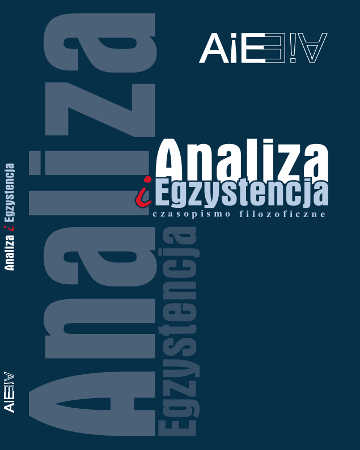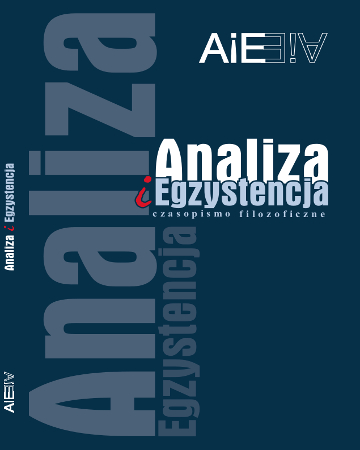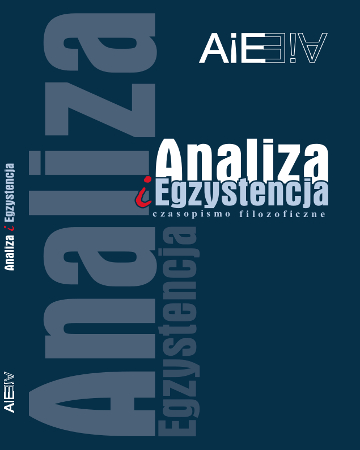
We kindly inform you that, as long as the subject affiliation of our 300.000+ articles is in progress, you might get unsufficient or no results on your third level or second level search. In this case, please broaden your search criteria.


The article propounds an interpretation of Nietzsche’s philosophy, in which the issue of illness would be instrumental. However, in contrast to any kind of reductionary biographism, the illness should be conceived as inextricably intertwined with the thinking itself. Nietzsche’s own illness was initially nothing more than a personal problem, yet it soon influenced his whole life, forcing to forgo the academic career. Thus afflicted, the philosopher used his experience to develop a new view on corporeality, diametrically opposed to Cartesianism. In the post-Cartesian model, objective thinking and illness have nothing in common; either corporal suffering exerts no influence upon thoughts, or the mind sinks into pure insanity. Whoever lost their faculties is still capable to stick to rationality, if only they accept the diagnosis, however subjectively unconvincing it would seem. Suspicious of the notion of truth, Nietzsche reverses the post-Cartesian model. Objective thinking, neatly separated from illness, as well as rational diagnoses appear to him as a fetish supporting those who cannot deal with their own corporeality. They repress their weaknesses, assuming the unfounded belief in objective thinking, which can be practised irrespective of personal malaise. However, Nietzsche’s suffering, which recurred irregularly and had no detectable grounds, couldn’t be separated not only from thinking, but from life as such. The philosopher was thus lead to advance a concept of “diet”, construed as broadly as possible, including the selection of food, lectures and embraced thoughts. The diet is the uttermost refutation of diagnosis, as it treats the mind and the body as a unity changing in time. The illness, which accompanies life inevitably, serves as a permanent yardstick of quality of our thoughts. Moreover, it gives us the opportunity to experience pure becoming.
More...

Criticism is nowadays broadly defined firstly, as a cognitive attitude consisting in investigation of rightness of one’s beliefs and considering true only those statements which are substantiated. Secondly, it is a cognitive attitude opposed to dogmatism (e.g. skepticism understood not as negative dogmatism but as zeteticism and ephecticism), which allows the possibility of changing one’s opinion as a result of occurrence of new facts or theories. Cosmological-ontological interpretation of early Greek philosophy, which is currently dominant, may be complemented (or even overcome) by a critical one. The article presents elements of Xenophanes’ philosophy (especially Xenophanes’ theological fragments) in the light of the problem concerning the historical origins of philosophical criticism. In this paper I try to recognize Xenophanes’ theological fragments not as a positive theology, but rather as an attempt to construct a dialectical metaphor (like in case of Gadder’s interpretations of Plato’s polis), which has emphasized the epistemological assumptions of his philosophy.
More...
The subject of this article is the role of chôrismos (separation) in the philosophy of Plotinus. Its primary aim is to explore relationships between chôrismos, dialectical method and noetic knowledge. The first part of this article demonstrate metaphysicaland methodological function of chôrismos, the essence of which is to establish thesubject matter of metaphysics (i.e. ontos on). The second part contains an analysisof the anagogic way of a soul to self-knowledge in the context of chôrismos andPlotinus’ aretology. The third part sums up our investigations. It develops relationships,extracted in previous sections, especially connections between dialectic andfunctions of chôrismos.
More...
Wittgenstein is the author of two conceptions of “grammar”, that were meant to betools of reaching the same goal: discrediting of the traditional, i.e. “metaphysical” questions of philosophy. His early conception concerns logical grammar being thelanguage of logic notation, which is devoid of logical constants. This idea was supportedby the ontological thesis that there are no logical objects. In fact, it was notindispensable for achieving the intended purpose, since the elimination of philosophicalproblems was provided by the semantic argument that the only sensiblestatements are those of the natural sciences.The second concept of grammar, presented in the writings of the later Wittgenstein,seems more ambiguous. Grammar is a set of rules of the language game,having a status of grammatical statements. Examples of such statements are diverse,and desirable, according to the authors, reformulation of them all into concrete ordersor prohibitions seems problematic. In the Investigations Wittgenstein distinguishes between deep and surface grammar, which serves to determine the proper task ofphilosophy as description of the deep grammar (especially the grammar of philosophically relevant words). In this sense New Philosophy is a kind of philosophicalgrammar. Wittgensteinian grammar is also anti-philosophical, as it aims at theelimination of erroneous (pseudo)metaphysical claims derived from misleadingforms of surface grammar. Despite the differences in the concepts of language andgrammar in the early and late Wittgenstein, he has not changed his critical approachto the traditional philosophical questions.
More...
The paper is devoted to the problem of the two paradoxes: the paradox of absolutevalue in Wittgenstein’s Lecture on Ethics and the paradox of Anselm’s Name of Godfrom the Proslogion. I try to present semantic determinants of the paradoxes as wellas similarities of their structures. However, the main part of the article focuses on thesolution of Anselm’s paradox given by Cora Diamond, the prominent Wittgensteinianscholar in her paper Riddles and Anselm’s Riddle. Diamond develops extensivecomparison of the concept of that than which nothing greater can be conceived anda series of peculiar riddles – she calls the Anselm’s concept the great riddle, since, asin other riddles presented, we cannot deal with it in a usual way. The author showsthat what enables us to resolve, say, the riddle of Sphinx, is our obtaining a new wayof understanding the words which compose the riddle itself, for the old way will notlead us to the proper answer. However, when it comes to the great riddle we knowthat we cannot obtain any way of understanding which will enable us to conceiveit. This does not mean that the riddle cannot make any sense for us. We can believethat there is a solution (in fact, we have the solution – it has been given to us inthe Revelation – but we cannot understand it) so we can treat the great riddle as aneuqation which we lack proof but we know there is one. As Diamond calls it, wehave the promissory meaning of the riddle. In my opinion the idea of the promissorymeaning is an interesting solution of Anselm’s paradox, but I notice that the ideaitself is conditioned by religious faith or by something I call the empathic atheism(in short: an attitude which lets atheists take the believers’ point of view).
More...
In the article Popper, Tarski and Relativism Jennings argues that according to T-equivalence all ontology (all sort of things in the world) is the derived from the first-order language. So such argumentation leads directly to the relativistic interpretation of Tarski’s semantic theory of truth. This interpretation is very controversial especially given that almost all philosophers of the Lvov-Warsaw School assert that truth is a nonrelativistic value. It seems that Alfred Tarski shares this view with Kazimierz Twardowski and his students. However there are many incompatible interpretations according to which the semantic theory of truth generates different consequences. Thus we can understand this theory in a relativistic, deflationist or absolutist ways. In this article I am reconstructing the relativistic and nonrelativistic interpretations of the semantic theory of truth and I attempt to provide an answer to the important question about whether or not Alfred Tarski is a relativist?
More...
The main goal of this article is to outline Barry Stroud’s conception of philosophy.Philosophy, in his opinion, aims at understanding of various kinds of phenomenaand our attitude towards them, but this understanding doesn’t manifest in a set ofphilosophical theses. A philosopher should become aware of a peculiar character ofunderstanding which he wants to reach, and in consequence, admit that a metaphilosophicalreflection is integral part of philosophical investigations. An understandingof the nature of philosophical investigations is not possible without pointing to theirsources. Thus the task of a philosopher is to diagnose philosophical problems byshowing from which earlier questions and theories they have arisen. On the otherhand, philosophical reflection must be always confronted with the things which areaccepted by all of us, otherwise understanding caused by that reflection wouldn’trefer to phenomena belonging to our world. Stroud thinks that a description of one’sconception of philosophy requires looking at the manner in which that philosopherapproaches to a given problem. Acknowledging the rightness of his remark I considerhis approach to philosophy using as an example his treatment of the question “whatis meaning?”. I point out that Stroud looks into the source of the Wittgensteinian slogan “meaning of the expression is its use”. The main Stroud’s conclusion is thatif a description of a use of a certain expression is to explain the meaning of thatexpression, semantical terms have to appear in that description. This statementcould be abandoned, Stroud claims, only if we rejected the things which all of usacknowledge as obvious.
More...
In the article I am describing epistemology R.H. Lotze’s, which as first enteredcomprehending the value into language of philosophy. He emphasized the limitationof the human mind in his project. He thought that metaphysics was insufficient asa base for science to arise. Therefore the sphere of the human cognition is supposedto be limited to a system of the importance and its confirmation in experience.As a result of such a thinking, it is necessary to express the cognition through thevalidity. Namely through the awareness of stretching it what detailed and general.
More...
In the paper Charles Taylor’s notion of strong evaluation and its crucial role inrelation to human agency has been presented. The departure point of our analysisis Harry Frankurt’s famous distinction between first- and second-order desires.Then, following Taylor, we describe two separate ways of evaluation of our desires– weak and strong evaluation. In further discussion the reconstruction of Taylor’stranscendental claim concerning the inescapability of strong evaluation in relationto selfhood is given. Finally we consider criticism that Owen Flanagan poses aboutTaylor’s account.
More...
The aim of the article is to describe the theoretical basis of the liberal democracyaccording to Ernest Laclau. His conception is a useful device for the analysis ofa socio-political situation of Others (the Excluded). By exposing Laclau theoreticalperspective (discourse, empty signifier, hegemony, emancipation) I attempted todisplay that this perspective does not only define the significant frames, thanks towhich the social life may go further, but it also reveals the multiplicity of contexts,diversity of social issues and various possibilities of their interpretation. Importantfactor of this perspective is that it points out the need for taking the action, which isaimed to improve democracy. According to Laclau the moment of visualization ofour desires is much more important than its realization, because it drives us towardaction and creative thinking.
More...

The notion of moral space covers all thin (universal) and thick (particular) characteristics that may plausibly be seen as morally relevant. In this paper, I investigate certain properties of moral space so defined. These properties are not easily visible if we analyze moral characteristics individually, but become clear once we consider them collectively. In particular, following Amartya Sen, I claim that the value of moral properties is, in part, a function of positional characteristics. I call this notion the non-homogeneity of moral space.
More...
The question what really—ultimately, basically, and so forth—exists remains a fundamental question of philosophy. It is also, however, a prime example of how misleading it can be to try to answer a philosophical question without first taking pains to clarify it. In this case, clarification has turned out to be difficult and controversial, which leads to a meta-question: Is this apparently fundamental question—the ontological question—also a pseudo-question, a question that should be dissolved rather than solved? This paper answers for an answer that is somewhat Meinongian.
More...
According to Jerry Fodor, there are two possibilities with respect to the origin of concepts: a concept is either innate, or it is acquired from experience by means of the process of ‘concept learning.’ Fodor’s view in his 1975 and 1980 is that the empiricist method of concept acquisition, forming and testing hypotheses about objects that fall under a concept, can only work for complex concepts. He claims that we must possess some concepts in order to form hypotheses, so none of our simple (or primitive) concepts can be learned. If we have them—then they must be innate. In his 2008 Fodor contends furthermore that no new concepts at all, neither primitive, nor complex, can be learned, and so that all concepts must be innate. I argue that Fodor’s famous mad-dog concept nativism should be rejected because it could only work together with what I call neural nativism, and the latter turns out to be scientifically untenable. In addition, I suggest that one’s position in the empiricism/nativism debate should be a function of one’s account of the architecture of the mind, which, in Fodor’s case, only implies architectural nativism, and so, the existence of innate mechanisms. It neither obviously requires, nor precludes, representational—or concept—nativism.Keywords
More...
The main question of our article is: What is the logical form of statements containing expressions such as “… is true” and “it is true that …”? We claim that these expressions are generally not used in order to assign a certain property to sentences. We indicate that a predicative interpretation of these expressions was rejected by Frege and adherents to the prosentential conception of truth. We treat these expressions as operators. The main advantage of our operational reading is the fact that it adequately represents how the words, “true” and “truth,” function in everyday speech. Our approach confirms the intuition that so-called T-equivalences are not contingent truths, and explains why they seem to be—in some sense—necessary sentences. Moreover, our operational readingof truth expressions dissolves problems arising from the belief that there is some specific property—truth. The fact that we reject that truth is a certain property does not mean that we deny that the concept of truth plays a very important role in our language, and hence in our life. We indicate that the concept of truth is inseparable from the concept of sentence and vice versa—it is impossible to explicate one of these concepts without appeal to the other.
More...
Aristotelian Forms are mysterious entities. I offer an account of them as entities that makes the laws of nature be laws. The Aristotelian ontology is fundamentally an anti-Humean ontology: Not only are laws a reality over and beyond regularities, but that in virtue of which they are laws is in fact that which is most truly called substance. If we further take it, say, on ethical grounds, that there are individual forms, then we get a multiplicity of substances in the universe, including multiple substances of the same sort, and the laws of nature end up being grounded in their powers. But we have global regularities, then, only because there is coordination between the lawmakers, or forms, of the solo doings of individual entities, a coordination that entails global patterns.
More...
The goal of the article is to present the context in which we, modern readers and scholars, make meaningful use of the words “happiness,” “luck,” and “fortune.” This discussion starts by examining Croesus’s question to Solon, who is the happiest man on earth, and then continues by analyzing Solon’s reply that a man can only be called happy after his death. Next, it aims to show what is implied and meant in Solon’s obscure reply. As the article explores, it turns out that Solon is talking about the transient fortune (ευτυχιη) and the permanent fortune (ολβος), measured after the number of fortunate moments in one’s lifespan, and not about the subjective disposition of being happy, as the modern speaker uses this term. At this point, the article offers Aristotle’s reading of Solon and his alternative interpretation of Solon’s concept of happiness. According to Aristotle, happiness is more a matter of character, of quality rather than quantity. The article continues by isolating the term “happiness” from the quantitative factor which still plays a role for Aristotle. In conclusion, the article presents a paradox that stems from conceiving happiness as a quantitative matter; that is, that not even death can serve as an ultimate final stage after which we could conclusively declare someone to have been happy or not.
More...
Emergence is a term used in many contexts in current science; it has become fashionable. It has a traditional usage in philosophy that started in 1875 and was expanded by J. S. Mill (earlier, under a different term) and C. D. Broad. It is this form of emergence that I am concerned with here. I distinguish it from uses like ‘computational emergence,’ which can be reduced to combinations of program steps, or its application to merely surprising new features that appear in complex combinations of parts. I will be concerned specifically with ontological emergence that has the logical properties required by Mill and Broad (though there might be some quibbling about the details of their views). I restrict myself to dynamical systems that are embodied in processes. Everything that we can interact with through sensation or action is either dynamical or can be understood in dynamical terms, so this covers all comprehensible forms of emergence in the strong (nonreducible) sense I use. I will give general dynamical conditions that underlie the logical conditions traditionally assigned to emergence in nature.The advantage of this is that, though we cannot test logical conditions directly, we can test dynamical conditions. This gives us an empirical and realistic form of emergence, contrary those who say it is a matter of perspective.
More...